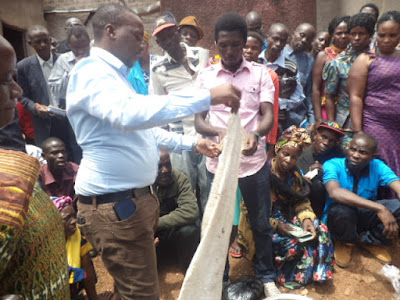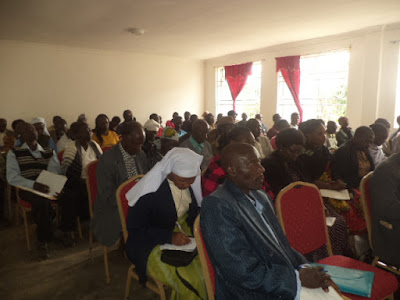ROLE OF WOMEN IN AGRICULTURE AND RURAL DEVELOPMENT IN AFRICAN COUNTRIES.
 Women are the backbone of the development of rural and national
economies. They comprise 43% of the world’s agricultural labor force,
which rises to 70% in some countries.
Women are the backbone of the development of rural and national
economies. They comprise 43% of the world’s agricultural labor force,
which rises to 70% in some countries.In Africa, 80% of the agricultural production comes from small farmers, who are mostly rural women. Women comprise the largest percentage of the workforce in the agricultural sector, but do not have access and control over all land and productive resources.
During the last ten years, many African countries have adopted new land laws in order to strengthen women’s land ownership rights. This has helped improve the situation of rural women.
To this effect, the lack of appreciation of the role of rural women in agriculture is harmful and gives rise to a lack of specific policies, policies which are misdirected, high levels of poverty, illiteracy and non-involvement in the design and planning of programs and policies, which involves a process of mutual learning that reflects the real and specific needs of rural women.

Despite the important roles they play in agricultural economies, rural
women in Africa suffer from the highest illiteracy rates and are the
most visible face of poverty.
Women guarantee livelihoods, especially in rural areas. As a result of their great efforts in agricultural production, women’s production helps to guarantee their self-sustenance.
This is still not enough, however, to cover other needs, such as health care, paying for the education of their children or the acquisition of other products and goods which are necessary on a day-to-day basis since they have a limited financial capacity caused by an inefficient supply chain and poor conservation of their surpluses.
Connected with these problems there is also the issue of climate change, which includes irregular rainfall, floods, droughts and cyclones, whose effects have a greater impact on rural women and make their life difficult.
Rural women have to walk, moreover, long distances to carry water and fetch firewood, which is harmful for the health of humans, causing high rates of infant and maternal mortality, reversing progress in education and endangering food sovereignty, as well as food security and nutrition.
Women guarantee livelihoods, especially in rural areas. As a result of their great efforts in agricultural production, women’s production helps to guarantee their self-sustenance.
This is still not enough, however, to cover other needs, such as health care, paying for the education of their children or the acquisition of other products and goods which are necessary on a day-to-day basis since they have a limited financial capacity caused by an inefficient supply chain and poor conservation of their surpluses.
Connected with these problems there is also the issue of climate change, which includes irregular rainfall, floods, droughts and cyclones, whose effects have a greater impact on rural women and make their life difficult.
Rural women have to walk, moreover, long distances to carry water and fetch firewood, which is harmful for the health of humans, causing high rates of infant and maternal mortality, reversing progress in education and endangering food sovereignty, as well as food security and nutrition.
The training of rural women is very important, especially with the
adoption of modern agricultural techniques that are tailored to local
conditions and that use natural resources in a sustainable manner, with a
view to achieving economic development without degrading the
environment.
It requires the dissemination of the results of research carried out by experts - including those on agro-ecological techniques -with a view to increasing Rural Women’s production levels.
To this effect, it must be pointed out that agro-ecological practices require the provision of certain public goods, such as extension services, storage facilities, rural infrastructure (roads, electricity, and information and communication technologies), access to markets and access to credit, as well as supporting organizations and farmer cooperatives.
It requires the dissemination of the results of research carried out by experts - including those on agro-ecological techniques -with a view to increasing Rural Women’s production levels.
To this effect, it must be pointed out that agro-ecological practices require the provision of certain public goods, such as extension services, storage facilities, rural infrastructure (roads, electricity, and information and communication technologies), access to markets and access to credit, as well as supporting organizations and farmer cooperatives.
Governments have a key role to play in relation thereto,
as well as supporting the access to land, water and seeds by rural women
who are involved in small-scale agriculture.
Giving support to rural women is a way of breaking the vicious cycle that leads to rural poverty and to the expansion of slums in the cities, where the poor get poorer. Development strategies should consider rural women as the epicenter, paying special attention to their social skills both within and without agriculture sector.
Giving support to rural women is a way of breaking the vicious cycle that leads to rural poverty and to the expansion of slums in the cities, where the poor get poorer. Development strategies should consider rural women as the epicenter, paying special attention to their social skills both within and without agriculture sector.
We,as an agribusiness venture (Mamaland Mushroom Farms)
we are recognizing the role that rural women play and the contribution
that they make in networks and cooperatives, giving them greater
support and involving them in the training and conducting of development
programs that enhance women's role in agricultural production.
Networks operating in rural areas, especially rural women's organizations, are partners to be involved in the conception of development programs.
-HAPPY INTERNATIONAL WOMEN DAY.
#BeBoldForChange (08/03/2017).
Networks operating in rural areas, especially rural women's organizations, are partners to be involved in the conception of development programs.
-HAPPY INTERNATIONAL WOMEN DAY.
#BeBoldForChange (08/03/2017).
Mamaland Mushroom Farm(2015).
E-Mail:-Mamalandmushroomproject@gmail.com,
Phone:+255682757566.
Twitter/Facebook/Linkedin/Google+:Mamaland mushroom farm.
Blog:Mamalandmushroomproject.blogspot.com





















































